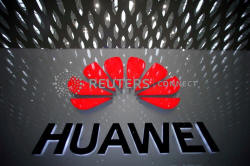U.S. lawmakers seek to curb Huawei's access to U.S.
banks: document
 Send a link to a friend
Send a link to a friend
 [March 12, 2020] By
Alexandra Alper [March 12, 2020] By
Alexandra Alper
WASHINGTON (Reuters) - U.S. lawmakers plan
to unveil a bill on Thursday that could be used to block Huawei
Technologies Ltd from accessing U.S. banks for certain transactions, in
a bid to thwart the Chinese telecoms giant amid frustration over the
failure of prior sanctions to curb its business.
The bill, with sponsors including top Senate Democrat Charles Schumer,
Republican Senator Tom Cotton, and House Republican Mike Gallagher,
would ban U.S. firms from taking part in "significant" transactions with
foreign companies that produce 5G telecommunications technology and
engage in industrial espionage.
If the bill were passed and Huawei designated, the company would be
shunned by U.S. banks in certain dealings with customers worldwide,
since most dollar payments clear through U.S. financial institutions.
"It is time for the Trump administration to take swift and forceful
action to block Huawei from accessing the U.S. financial system,"
Schumer said in a statement, adding that allowing China to dominate
global 5G networks through Huawei poses a threat to national security.
Huawei did not respond to a request comment.

The legislation is part of a broader campaign to crack down on Huawei,
the top producer of telecoms equipment, since the company has continued
to thrive despite American sanctions.
Citing national security concerns, the Trump administration placed
Huawei on a blacklist known as the "entity list" in May, forcing some
firms to seek a special license to sell to it
But under current rules, key foreign supply chains remain beyond the
reach of U.S. authorities, fueling a push within the Trump
administration to impose tougher regulations on the company, as Reuters
revealed in November.
That effort appears to have stalled, as authorities Wednesday again
postponed a high-level meeting on the matter, sources said, amid deep
divisions between China hawks and doves in the administration.
"The entity list is not getting the job done," Gallagher said, in
describing the goals of the legislation.
[to top of second column] |

A Huawei company logo is pictured at the Shenzhen International
Airport in Shenzhen, Guangdong province, China July 22, 2019.
REUTERS/Aly Song/File Photo

Still, Gallagher acknowledged that policy differences in the Trump
administration could pose challenges to imposing the proposed sanctions on
Huawei. "I'm sure there will be a debate in the White House ... but my hope is
to convince [the President] it is necessary in order to at least fight Huawei to
a draw on 5G and preserve the hope that Western firms can compete for 6G and
beyond," he said.
The legislation has plenty of exemptions, such as carve-outs for Huawei to
continue engaging in transactions related to 3G and 4G and participate in
international standards setting bodies. It also gives the President the
authority to grant waivers of up to 90 days at a time.
But with no clear definition of "significant" transactions, banks would struggle
to know which transactions should be blocked, in the face of stiff civil and
possibly even criminal penalties for violations, sanctions specialists said.
That would compel regulators to develop their own more concrete definitions,
they added.
It is not the first time the concept has been mulled for Huawei. The White House
considered a more sweeping ban on Huawei's use of the U.S. financial system last
year, Reuters reported, though the plan was ultimately shelved.
The U.S. government has brought criminal charges against Huawei, alleging theft
of trade secrets, bank fraud, violations of U.S. sanctions against Iran,
allegations denied by the company.

Additional sponsors of the bipartisan legislation include Senators Rick Scott
and Chris Van Hollen as well as Members of Congress Ruben Gallego, Liz Cheney
and Chrissy Houlahan.
(Reporting by Alexandra Alper; Editing by Nick Zieminski)
[© 2020 Thomson Reuters. All rights
reserved.] Copyright 2020 Reuters. All rights reserved. This material may not be published,
broadcast, rewritten or redistributed.
Thompson Reuters is solely responsible for this content. |